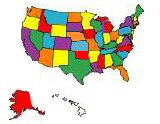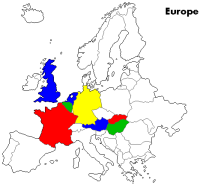Würzburg
Würzburg, Germany 5/8/2019
Our ship docked at Würzburg at 7am after traveling all night from Bamberg, but we got to rest up since our Würzburg Residenz and Walking Tour didn’t start until 1pm. So we had plenty of time for a leisurely breakfast and a nice lunch with our friends before we headed for the buses.
Our first stop was, of course, the Würzburg Residenz.
Originally the Prince-Bishops of Würzburg resided in the Marienberg Fortress located on a hill overlooking the Main River and the city.
Note the vertically-planted vineyards. We saw vines planted like this all over Europe, but they’re apparenlty being phased out due to goivernment saftely regs. It seems that the workers slipping and rolling all the way to the bottom is a real problem. So now they’re moving to terracing.
But the Prince-Bishops thought that the Fortress was just too small to measure up to their exalted position. This is what they thought was too dinky for them.
So in 1720 construction was started on the Residenz, but like a lot of these projects, it dragged on through several different rulers, and it took 24 years to finish the exterior buildings, and then another 36 years to finish off the interiors in 1780..
But it was worth it as you can see from these exterior shots.
And what it looks like from the read, out over the gardens.
Unfortunately, like many of these places, the Residenz had a ‘no photos’ rule. Now, of course, I can understand a ‘no flash’ rule, but really, why no photos at all?
And as usual, somebody’s taking photos because they’re all over the Internet, so you get to see some of those. And the place is really something.
We spent a couple of hours touring the palace, and as happened in Nuremberg, when we came out, it had gotten much colder and was now sprinkling. None of which was forecast. Nothing new, of course.
We started the Walking part of the tour, heading into town, about a 15 minute walk, first checking out the Old Stone Bridge.
The first bridge here was built in 1120 A.D., but was destroyed in a flood in1342. It was rebuilt, and, until 1885, was the only to get to Wurzburg from across the river.
Of course, when it was built, it was a pedestrian bridge, and still is.
As we walked around we came across a number of these burled trees.
I don’t know what the story is on these, but there’s nothing on the Internet about them.But they were all over the place.
Our next stop was at St. Michael’s Church.
Like many churches over here, there have been a series of churches here, with the first one dating to 1221 A.D.
This incarnation dates from 1763, a veritable youngster in this area.
As this point, as evidenced from the raindrops on the photo above, and the fact that it was getting even colder, we decided to end our participation on the walking tour and headed back to the bus. And so did a lot of others.
One last fact is that in 1895, William Roentgen, working in his lab in Wurzburg, discovered X-Rays, and in 1901 was awarded the very first Nobel Prize in Physics for his discovery.
The same one that Sheldon won.
Later at about 7pm, warmer and drier, and with a nap under our belts, we met our friends for dinner.
We both started off with the Ginger Carrot Soup,
Really declivous, and reminded us of the fabled Pie-O-Neer in Pie Town, NM.
Jan had the Grilled Tilapia,
while I once again had my favorite Angus Ribeye. You just can’t have too much steak.
And for dessert, we both had the Apple Strudel.
You can’t go wrong with Apple Strudel in Germany.
Next Up: Wertheim Am Main (Wertheim on the Main River)
adfadsf
























